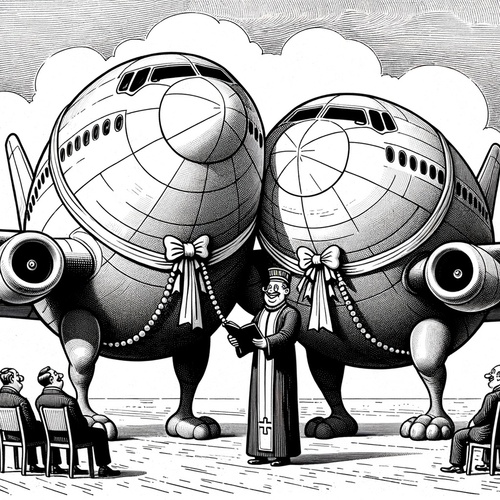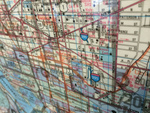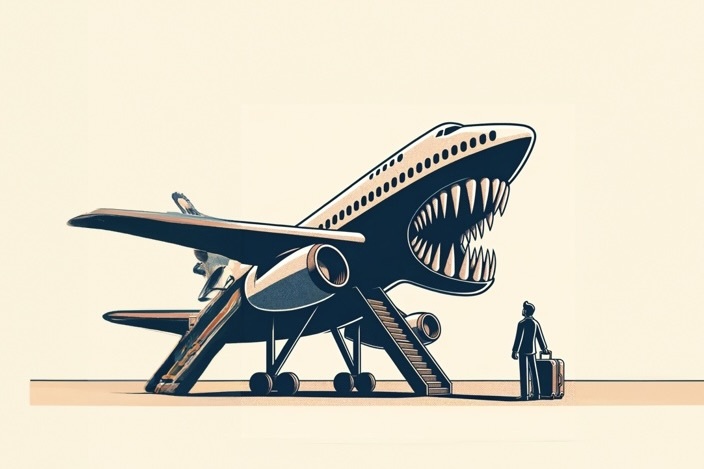I spent Halloween in federal court in Boston at a trial that pits the U.S. Department of Justice (DOJ) against the merger of JetBlue Airways and Spirit Airlines.
There have been much bigger airline mergers in the United States over the last four decades, but in many ways, the JetBlue–Spirit one is the most important merger of them all. Because while some media outlets are largely ignoring the trial’s closing arguments this week, the airline industry is following them closely.
For the first time in memory, the federal government is aggressively fighting against airline consolidation, and that’s an opportunity that may not come again.
In March, the DOJ filed suit against JetBlue–Spirit, and that same day, the Department also voiced its opposition. Context is everything here. I’ve been in and around the airline industry since 1985, for the last 23 years as an airline consumer and competition advocate, and I’ve been on the front lines fighting consolidation. But I’d never seen the DOJ put up a truly meaningful fight. I haven't actually previously seen the DOT put up any kind of fight at all.
The government has simply rubber-stamped dozens of mergers since the 1980s, providing the most modest of pushbacks. For years, the common wisdom in Washington was, “Forfeit a few takeoff and landing slots at National Airport, and we’ll sign off on the deal.”
I saw this phenomenon up close and personal while testifying in both the House and Senate against the “mega-mergers” that turned the Big Six network airlines into the Big Three: Delta–Northwest, United–Continental, and American–US Airways. Approved. Approved. Approved. Rinse. Repeat.
What we’ve seen over the years is that airline mergers always beget more airline mergers. My organization, American Economic Liberties Project, expressed exactly that earlier this week when news broke that Alaska Airlines is seeking to acquire Hawaiian Airlines. For airline executives, mergers are all about size—as in the size of their market share. Clearly, Alaska can’t abide the thought of JetBlue attaining the coveted #5 spot in the rankings, so both are desperately seeking partners to quickly bolster their size.
As you can see from this chart compiled by Airlines for America, mergers and acquisitions are a phenomenon that largely took off after the industry was deregulated in 1978. In the last 44 years, we’ve seen 44 mergers—and counting.
Consider the household names that have disappeared since 1979: Pan Am, TWA, Eastern, Northwest, Continental, US Airways, Republic, National, Western, PEOPLExpress, ValuJet, ATA, America West, Midwest, AirTran, Virgin America, etc., etc. And now Spirit may soon join the airline boneyard.
So what has all this concentration brought us?
Untold harms to passengers, businesses, labor, cities, and even entire regions of the country.
Consider that the dismal state of airline service in recent years has been made acceptable in large measure by insufficient competition. Weakened industry rivalry has affected everything from flight disruptions to junk fees, and from soaring fares on certain routes to the safety hazard of tighter seats.
In many airports around the country, there are now no low-fare competitors. Average fares are driven upward because the largest airlines really don’t compete on price anymore.
Mergers have laid off tens of thousands of workers, canceled routes, reduced flight frequencies, and widened the “regional inequality” gap tremendously in the decades since deregulation.
And it isn’t just small and rural communities that have suffered. The closures of hub airports have handicapped the economies of cities as large as Cincinnati, Cleveland, Pittsburgh, and St. Louis.
We’re in a place we’ve simply never been before, not since the first airline ticket was sold in Tampa in 1914:
• Today we have only 12 scheduled passenger airlines, the lowest total since the 1910s.
• The Big Four oligopoly of American, Delta, Southwest, and United control 80% of the domestic market, a level of concentration that far surpasses domination at the top in previous eras.
• We recently went 14 years (2007–2021) without a single new-entrant scheduled passenger carrier. That is the longest dearth of any such period in U.S. airline history.
This deterioration is why my organization, American Economic Liberties Project (AELP), filed comments last year with the DOJ and Federal Trade Commission calling for a moratorium on all airline mergers until a thorough examination of the harms of previous mergers could be conducted.
Amazingly, such research has never been done, despite the fact that these mergers are affecting most American travelers.
But the good news is that the pending FAA Reauthorization Act includes language directing the Government Accountability Office to conduct a study that will do just that.
In the meantime, however, Judge William Young in Boston will soon decide on the $3.8 billion melding of Low Cost Carrier (LCC) JetBlue and Ultra Low Cost Carrier (ULCC) Spirit. JetBlue swears it is still the low-fare airline it once was, even while its costs have ballooned as it tries to emulate the flights of the major network airlines. Earlier this year, the same federal court in Boston struck down JetBlue’s “Northeast Alliance” de facto merger with American Airlines. Quick—name another industry in which a company partners on pricing with one of the same companies it’s claiming to compete against.
The DOJ has asserted: “The proposed acquisition is presumptively illegal in at least 183 markets where JetBlue and Spirit compete, including 51 nonstop overlaps.”
The simple fact is that eliminating Spirit, the nation’s largest ULCC, will drive up fares nationwide and make air travel unattainable for low-income Americans. This is especially true in cities as large as Chicago (where Spirit operates 13 nonstop routes) and Detroit (19 nonstop routes).

An MIT study found the presence of an ULCC like Spirit at an airport lowers fares by 21%, while an LCC like JetBlue lowers them by only 8%.
You also can take the word of a trusted source on this: JetBlue itself. Court documents inadvertently revealed that JetBlue internally estimated that after a merger, Spirit routes would see price increases of 24% to 40%.
I get it—not everyone wants to fly Spirit. But that argument misses two key points:
1) You don’t have to book Spirit to benefit from its presence. Even passengers who fly the same routes on rival airlines gain, because the majors lower their fares in response to ULCCs.
2) For many Americans, Spirit’s route map of 90 destinations in the U.S., Caribbean, and Latin America is what enables countless travelers to visit family, friends, and their homelands because they simply couldn’t afford to fly there otherwise.
One of the airline industry’s dirtiest secrets is that too many of its players have no desire to truly compete, particularly since “common ownership” means the same institutional investors have spread their chips around the table by owning stakes in not just one or two carriers, but four or more. (AELP also has proposed a solution for eliminating common ownership.)
America has a crisis in commercial aviation, and one of the fundamental problems is consolidation. All airline mergers are harmful, not just those among the largest carriers, and this merger is no different.
JetBlue has tried to frame its move as the union of two smaller carriers not worthy of the DOJ’s attention. CEO Robin Hayes said: “This is not Pepsi buying Coke. Together, we are going to be 8–9% of the market…a distant fifth-largest airline.”
But this is a false argument. Airlines are not like other industries. You can buy Pepsi or Coke in virtually any grocery store in the country, but you can’t fly JetBlue or Spirit out of every commercial airport in America (nor American or Delta or United, for that matter).
Market share in the airline business is city-by-city and route-by-route. For example, DOT stats show JetBlue is the most dominant carrier at New York/JFK and Boston, and one of the largest at Fort Lauderdale and Orlando. Spirit is the biggest carrier at Fort Lauderdale, and among the biggest at Atlanta, Dallas/DFW, Miami, Detroit, Chicago O’Hare, Las Vegas, and Orlando. Each market is different.
So don’t believe the hype that this merger won’t negatively affect competition and pricing, because it certainly will.
The answer to the problem of consolidation is not allowing more consolidation. It’s the opposite.
The answer is preventing further consolidation. Hopefully that’s what Judge Young will rule. Because if he allows JetBlue to swallow up Spirit, the harmful effects will be felt from coast to coast, and in millions of Americans’ abilities to access travel at all.
William J. McGee is the Senior Fellow for Aviation & Travel at American Economic Liberties Project. An FAA-licensed aircraft dispatcher, he spent seven years in airline flight operations management and was Editor-in-Chief of Consumer Reports Travel Letter. He is the author of Attention All Passengers and teaches at Vaughn College of Aeronautics. There is more at www.economicliberties.us/william-mcgee/.






